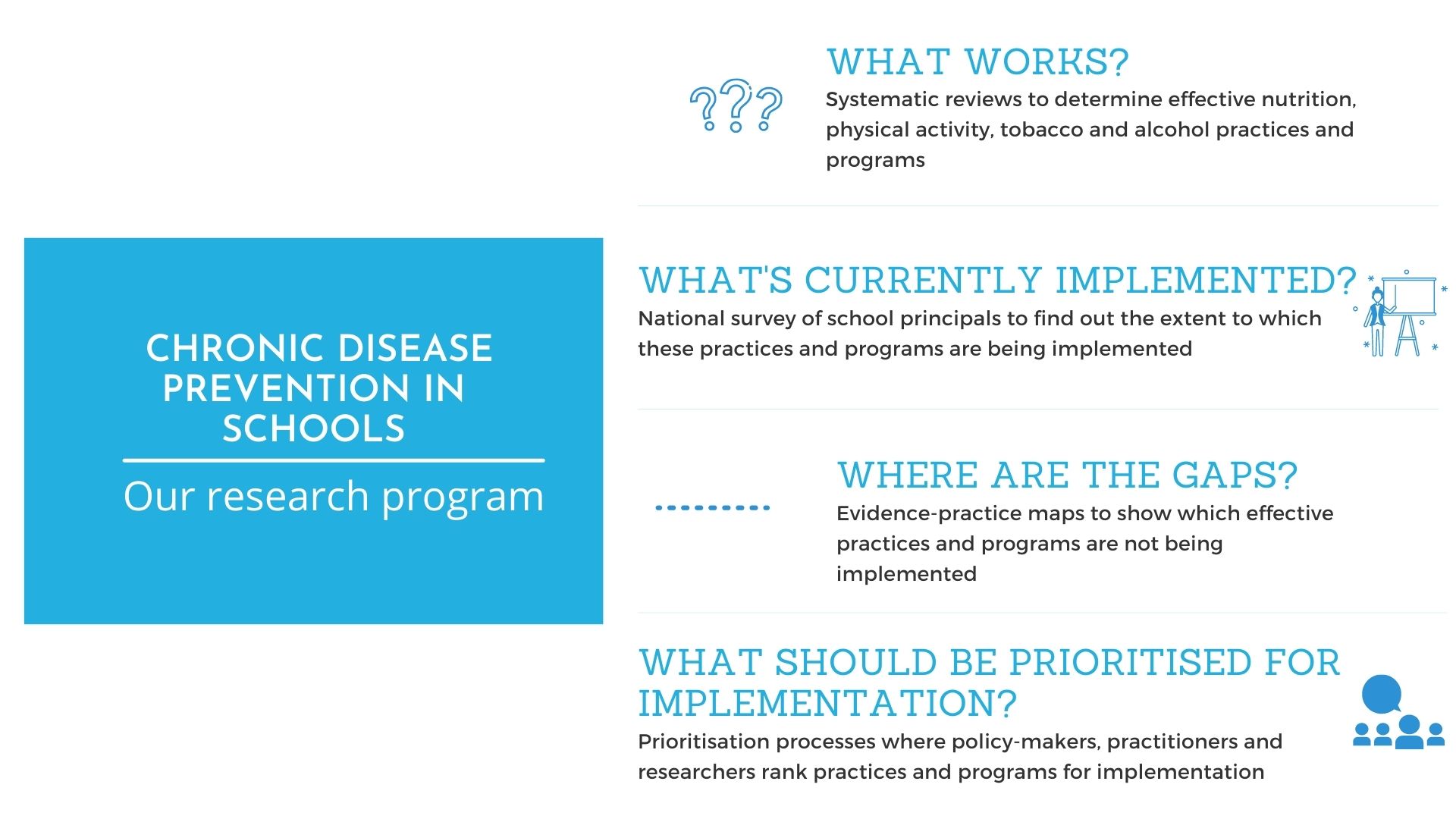What is the issue?
We can improve the health of children and young people by ensuring effective chronic disease prevention interventions targeting nutrition, physical activity, obesity, tobacco and alcohol are routinely implemented.
This program of research will identify which programs and practices targeting these risk factors are effective in schools and early childhood education and care.
It will identify which of these effective programs and practices are not currently being routinely implemented, and which should be prioritised for implementation.
How will this program help?
We are finding out which nutrition, physical activity, tobacco and alcohol interventions, programs, practices, and policies are effective. We are finding out the extent to which these are being implemented. We are identifying where there are gaps in implementation.
Using this information, we will work with policy makers and health promotion practitioners to identify which programs and practices should be prioritised for implementation within their contexts.
Schools

How are we conducting this research?
We will conduct systematic reviews to determine which school-based nutrition, physical activity, tobacco and alcohol use programs and practices are effective.
A national survey of school principals will determine the extent to which these effective programs and practices are implemented in schools. We will telephone survey 1000 principals in Australian primary schools. Participants will be based across all states and territories (randomly sampled, stratified by state or territory).
We will use the systematic review and national survey evidence to identify evidence to practice gaps. By doing this, we will determine which effective programs and practices are not currently being implemented. We will also ask about the acceptability, feasibility, sustainability, and reach of the effective practices and programs identified in the systematic reviews.
Policy-makers, practitioners and researchers will then rank priority programs for implementation based on their effectiveness, scalability, acceptability, feasibility, sustainability, reach/adoption, and risk of adverse events.
Our findings will help policy makers and practitioners know where to invest support for the implementation of effective nutrition, physical activity, tobacco and alcohol programs and practices in schools to improve the health of children and young people.
Research Lead: Dr Rebecca Hodder.
Publications:
Interventions to prevent obesity in school-aged children 6-18 years: An update of a Cochrane systematic review and meta-analysis including studies from 2015-2021. EClinicalMedicine, 2022. DOI: http://dx.doi.org/10.1016/j.eclinm.2022.101635. Plain language summary: In which settings are programs effective for preventing obesity in school-aged children.
School-Based Nutrition Interventions in Children Aged 6 to 18 Years: An Umbrella Review of Systematic Reviews. Nutrients. 2021. DOI: https://doi.org/10.3390/nu13114113. Plain language summary: A worldwide look at school-based healthy eating programs.
Early Childhood Education and Care
How are we conducting this research?
We will use systematic reviews to determine which programs and practices are effective in improving nutrition and physical activity in childcare settings. This will result in a comprehensive summary of all literature in the field.
We will also use systematic reviews to determine which programs and practices are recommended by health and regulatory bodies as published in policies and guidelines for early childhood education and care settings. This will provide evidence of support for the interventions described above.
A national survey of childcare services will determine the extent to which effective (and recommended) programs and practices are being implemented in childcare. We will also ask about the barriers to implementing the programs, the feasibility, and what factors promote sustainability and scalability of these programs.
We will use the systematic review and national survey evidence to map where there are evidence to practice gaps. By doing this, we will determine where the gaps are for program implementation.
Policy-makers, practitioners and researchers will then rank priority programs for implementation based on their effectiveness, scalability and feasibility.
Read our research update August 2022.
Find more about our researchers’ work to promote healthy eating and physical activity in Early Childhood Education and Care on our GrowKudos page.
Research lead: Dr Serene Yoong.
Publications:
Assessing the scalability of evidence-based healthy eating and physical activity interventions in early childhood education and care: A cross-sectional study of end-user perspectives. Australian and New Zealand Journal of Public Health. DOI: https://doi.org/10.1016/j.anzjph.2023.100122.
Implementation of healthy eating and physical activity practices in Australian early childhood education and care services: A cross-sectional study. 2023. Preventive Medicine Reports. DOI: https://doi.org/10.1016/j.pmedr.2023.102455.
Healthy eating interventions delivered in early childhood education and care settings for improving the diet of children aged six months to six years. Cochrane Database of Systematic Reviews 2023. DOI: 10.1002/14651858.CD013862.pub2. Read summary here.
Interventions to Improve Child Physical Activity in the Early Childhood Education and Care Setting: An Umbrella Review. Int. J. Environ. Res. Public Health, 2022. DOI: https://doi.org/ 10.3390/ijerph19041963. Read summary here.
Obesity Prevention within the Early Childhood Education and Care Setting: A Systematic Review of Dietary Behaviour and Physical Activity Policies and Guidelines in High Income Countries. Int J Environ Res Public Health, 2021. DOI: https://doi.org/0.3390/ijerph18020838.
The Association between Australian Childcare Centre Healthy Eating Practices and Children’s Healthy Eating Behaviours: A Cross-Sectional Study within Lunchbox Centres. Nutrients, 2021. DOI: https://doi.org/10.3390/nu13041139.
Interventions for increasing fruit and vegetable consumption in children aged five years and under. Cochrane Database of Systematic Reviews 2024. DOI: https://doi.org/10.1002/14651858.CD008552.pub8. Read the summary here.
Workplaces
How are we conducting this research?
We have undertaken an umbrella review of workplace interventions targeting health risk factors.
Research lead: Dr Serene Yoong.
Publications:
Interventions in the workplace to reduce risk factors for noncommunicable diseases: an umbrella review of systematic reviews of effectiveness. Journal of Occupational Health, 2024. DOI: https://doi.org/10.1093/joccuh/uiae044 Read the summary.
Sporting Clubs
How are we conducting this research?
We have undertaken a Cochrane systematic review of the effectiveness of chronic disease prevention interventions in sporting clubs.
Research Lead: Dr Rebecca Hodder.
Publications:
Interventions implemented through sporting organisations for promoting healthy behaviour or improving health outcomes. Cochrane Database of Systematic Reviews, 2025. DOI: https://doi.org/10.1002/14651858.CD012170.pub2. Read the summary. See the visual abstract.
